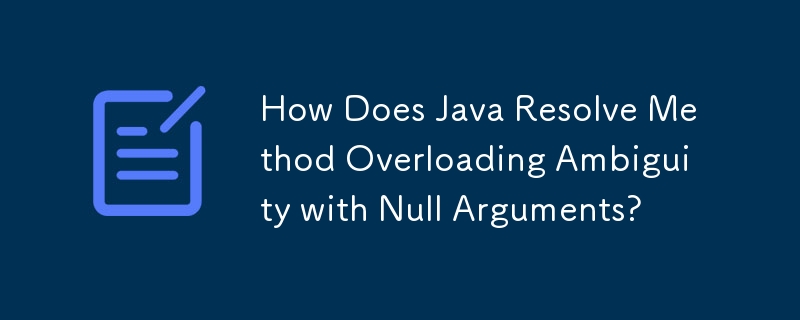Home >Java >javaTutorial >How Does Java Resolve Method Overloading Ambiguity with Null Arguments?
How Does Java Resolve Method Overloading Ambiguity with Null Arguments?
- Mary-Kate OlsenOriginal
- 2024-12-31 21:33:14451browse

Method Overloading with Null Arguments: Resolving Ambiguity
Java's method overloading allows multiple methods with the same name but different parameters. However, when calling a method with a null argument, the compiler may encounter ambiguity if there are multiple applicable methods.
In the given code snippet, we have three doSomething methods with parameters of Object, char[], and Integer. When calling doSomething(null), an ambiguous methods error arises. Let's delve into the issue.
Ambiguity Resolution
Java prioritizes the most specific applicable method version (JLS §15.12.2). All three methods accept null as a valid argument, making them equally applicable.
Object vs. char[]
Object is the supertype of char[], which means char[] is more specific than Object. Therefore, if only the Object and char[] methods exist, the char[] method would be selected.
Object vs. Integer
However, with both the char[] and Integer methods present, neither is more specific than the other. Java cannot determine which one to call, resulting in ambiguity.
Solution
To resolve the ambiguity, explicitly cast the null argument to the desired type:
doSomething((Integer) null);
In this case, the compiler will explicitly call the doSomething(Integer obj) method.
Practical Relevance
Ambiguity with null arguments is less common than one might think. It typically occurs when explicitly invoking a method with null or using a variable of an unspecified type (like Object).
In contrast, if you pass a variable to a method, such as:
char[] x = null; doSomething(x);
Java will correctly determine the intended method based on the variable's type, despite passing a null value.
The above is the detailed content of How Does Java Resolve Method Overloading Ambiguity with Null Arguments?. For more information, please follow other related articles on the PHP Chinese website!

